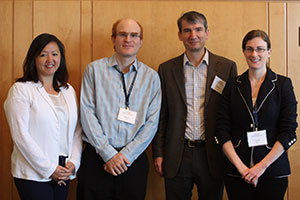
The Marketing Department hosted the 2014 ING Global Colloquium, Social Media Insights: Implications for Digital Marketing & Analytics, on April 4. The colloquium was a great opportunity to learn from cutting edge researchers in the areas of social media, digital marketing, and digital analytics.
Wendy Moe (University of Maryland) spoke on Social Media Intelligence: Behaviors, Biases and Brand Tracking, Moe, who has written a textbook on marketing analytics, spoke about the importance of accounting for differences across social media platforms and integrating insights across these platforms when conducting consumer sentiment analysis. In a paper with her coauthor (David Schweidel, Emory University), she develops a new brand sentiment metric that accounts for sentiment characteristics and posters’ social media platform choices. Empirical tests on social media comments for enterprise software and telecommunications show that the new metric outperforms existing metrics used by social media aggregators in terms of predicting stock prices and changes in brand sentiment in offline brand tracking surveys.
Sarah Moore (University of Alberta) presented a paper entitled Material Words: Explaining Language in Word of Mouth.In this paper, Moore argues that online reviewers use different types of explanations to explain their choices of utilitarian and hedonic products. For utilitarian products, consumers tend to provide action explanations (“I chose this product because…”), but for hedonic products, consumers tend to provide reaction explanations (“I love this product because…”). Using data from Amazon.com as well as a series of lab experiments, Moore finds significant differences in the types of explanations used for utilitarian and hedonic products. She also finds that consumers of utilitarian products find reviews with action (versus reaction) explanations to be more helpful and are more likely to consume the reviewed product after reading action explanations in reviews. She finds the opposite for hedonic products for which reaction explanations are perceived as more helpful and have a stronger influence on consumption.
Olivier Toubia (Columbia University) presented a paper entitled Improving Penetration Forecasts Using Social Interactions Data. In this paper, co-authored with Jacob Goldenberg of the Arison School of Business (Israel) and Rosanna Garcia, Northeastern University, Toubia develops a method to improve new product diffusion forecasts by using individual level social interaction data, such as the number of recommendations provided and received by adopters and non-adopters of a product as well as social network ties, to supplement initial aggregate penetration data. A test of the model in collaboration with a major consumer packaged goods company on a new cooking product shows that incorporating social interactions significantly improves the accuracy of penetration forecasts.
Nicholas Lurie (University of Connecticut) presented a paper entitled Going Mobile: Characteristics and Perceived Value of Mobile Word of Mouth. In this paper, Lurie and his coauthors (Sam Ransbotham of Boston College and Hongju Liu of the University of Connecticut) investigate how the content and perceived value of mobile word-of-mouth differs from that created using traditional (i.e., desktop) platforms. Using data from Urbanspoon.com mobile and non-mobile restaurant reviews, the authors find that content created on mobile devices is more affective, less cognitive, and more one-sided. In addition, mobile word of mouth reflects greater current (vs. past or future) concerns and is more negative than desktop word of mouth. Results show that while some of these content differences increase the value of mobile word of mouth others lower its perceived value relative to desktop word of mouth. After controlling for observable differences in the content of mobile and desktop word of mouth, the authors find that mobile word of mouth is less valued than desktop word of mouth.
